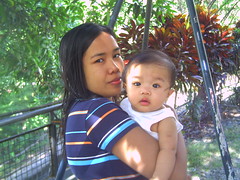In the well-known passage of the Gospel called the Sermon on the Mount, Jesus teaches us to love our enemies - in fact, to "bless" those who persecute us. But it wasn't just a sermon. As his unmistakably compassionate plea from the cross shows - "Father, forgive them, for they know not what they do" - he practiced what he preached. So did Stephen, the first Christian martyr, who prayed much the same thing as he was being stoned to death: "Father, do not hold this against them."
Many people dismiss such an attitude as self-destructive foolishness. How and why should we embrace someone intent on harming or killing us? Why not fight back in self-defense?
For me, the act of forgiveness carries a lot of power. It is an assertion of one's dignity to have the means and ability to forgive...It may be difficult to understand, because it turns conventional logic on its head, but idealistically speaking, I think that if there is to be peace, there has to be forgiveness...
Probably no admonition of Jesus has been more difficult to follow than the command to love our enemies. Some people have sincerely felt that its actual practice is not possible. It is easy, they say, to love those who love you, but how can one love those who openly and insidiously seek to defeat you...?
Far from being the pious injunction of a Utopian dreamer, the command to love one's enemy is an absolute necessity for our survival. Love even for our enemies is the key to the solution of the problems of our world. Jesus is not an impractical idealist; he is the practical realist...
Returning hate for hate multiplies hate, adding deeper darkness to a night already devoid of stars. Darkness cannot drive out darkness; only light can do that. Hate cannot drive out hate; only love can do that. Hate multiplies hate, violence multiplies violence, and toughness multiplies toughness in a descending spiral of destruction...
Love is the only force capable of transforming an enemy into a friend. We never get rid of an enemy by meeting hate with hate; we get rid of an enemy by getting rid of enmity. By its very nature, hate destroys and tears down; by its very nature, love creates and builds up. Love transforms with redemptive power.
We must develop and maintain the capacity to forgive. Whoever is devoid of the power to forgive is devoid of the power to love. It is impossible even to begin the act of loving one's enemies without the prior acceptance of the necessity, over and over again, of forgiving those who inflict evil and injury upon us.
It is also necessary to realize that the forgiving act must always be initiated by the person who has been wronged, the victim of some great hurt, the recipient of some tortuous injustice, the absorber of some terrible act of oppression. The wrongdoer may request forgiveness. They may come to themselves, and like the prodigal son, move up some dusty road, their heart palpitating with the desire for forgiveness. But only the injured neighbor, the loving father back home, can really pour out the warm waters of forgiveness.
Forgiveness does not mean ignoring what has been done or putting a false label on an evil act. It means, rather, that the evil act no longer remains as a barrier to the relationship. Forgiveness is a catalyst creating the atmosphere necessary for a fresh start and a new beginning...
To our most bitter opponents we say: We shall match your capacity to inflict suffering by our capacity to endure suffering. We shall meet your physical force with soul force. Do to us what you will, and we shall continue to love you.
We cannot in all good conscience obey your unjust laws, because no cooperation with evil is as much a moral obligation as is cooperation with good. Throw us in jail, and we shall still love you. Send your hooded perpetrators of violence into our community at the midnight hour and beat us and leave us half dead, and we shall still love you. But be ye assured that we will wear you down by our capacity to suffer.
One day we shall win our freedom, but not only for ourselves. We shall so appeal to your heart and conscience that we shall win you in the process and our victory will be a double victory.
When people hate, its power engulfs them and they are totally consumed by it...Keep struggling against hatred and resentment. At times you will have the upper hand; at times you will feel beaten down. Although it is extremely difficult, never let hatred completely overtake you...
Never stop trying to live the commandment of love and forgiveness. Do not dilute the strength of Jesus’ message; do not shun it; do not dismiss it as unreal and impractical. Do not cut it to your size, trying to make it more applicable to real life in the world. Do not change it so that it will suit you. Keep it as it is, aspire to it, desire it, and work for its achievement.
Far from leaving us weak and vulnerable, forgiveness is empowering, both to the person who grants it and the one who receives it. In bringing true closure to the most difficult situations, it allows us to lay aside the riddles of retribution and human fairness, and to experience true peace of heart. Finally, it sets into motion a positive chain reaction that passes on the fruits of our forgiveness to others.
An Article by Johann Christoph Arnold














